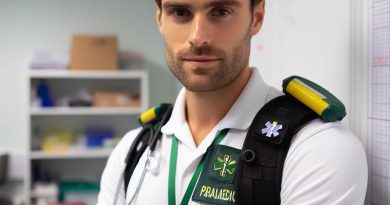The Path to Becoming a Surgeon in the UK
Last Updated on January 27, 2024
Introduction
Embarking on the path to becoming a surgeon in the United Kingdom is a profound and demanding journey that necessitates unwavering commitment and dedication.
In this blog section, we’ll delve into the intricacies of this transformative process, providing a comprehensive guide for aspiring surgeons.
The significance of skilled surgeons in the healthcare system cannot be overstated.
As frontline practitioners, they play a pivotal role in the delivery of specialized medical care, addressing a myriad of health issues with precision and expertise.
The demand for proficient surgeons is incessant, as they navigate complex procedures and contribute significantly to the well-being of patients.
This blog seeks to illuminate the multifaceted route to surgical excellence in the UK.
From the early stages of academic prerequisites to the hands-on training in clinical settings, each step molds aspiring surgeons into capable professionals.
Join us as we unravel the layers of this challenging yet rewarding journey, exploring the importance of skilled surgeons and the vital role they play in meeting the evolving healthcare needs of the nation.
Educational Requirements
To become a surgeon in the UK, certain academic qualifications are necessary. These qualifications serve as the foundation for a successful career in the medical field.
Obtain a Medical Degree
One of the most crucial steps in the path towards becoming a surgeon is obtaining a medical degree from a recognized university. This is a prerequisite for specialization in surgery.
Adhere to University Admission Criteria
To secure admission into a medical school, aspiring surgeons must meet the specific criteria set by each university.
These criteria typically include high school transcripts, personal statements, and entrance exams.
Focus on Science and Math Subjects
During high school, it is crucial for students aspiring to become surgeons to excel in science and math subjects. A strong foundation in biology, chemistry, and physics is essential.
Pursue a Pre-Medical Degree
Some students may choose to pursue a pre-medical degree before entering medical school. This degree acts as a stepping stone and provides a comprehensive understanding of the medical field.
Complete Medical School
Once admitted into medical school, students undergo a rigorous five to six-year program. Here, they learn the foundations of medicine, including anatomy, physiology, pharmacology, and patient care.
Achieve Excellent Grades
Throughout the educational journey, aspiring surgeons must strive to achieve excellent grades. Academic performance plays a vital role in securing competitive residency placements and fellowships.
Participate in Clinical Rotations
During medical school, students participate in clinical rotations across various disciplines including surgery. These rotations provide valuable hands-on experience and shape their surgical skills.
Undertake Residency Training
After completing medical school, graduates must undergo residency training in surgery. This intensive program lasts for a minimum of five years and includes both rotations and didactic learning.
Apply for Fellowships
Some surgeons choose to pursue fellowships after residency training. Fellowships provide specialized training in a particular surgical field, such as cardiothoracic surgery or pediatric surgery.
Continuously Update Knowledge and Skills
To stay at the forefront of medical advancements, surgeons must constantly update their knowledge and skills. Continuing medical education programs and conferences help in achieving this.
Generally, a successful path to becoming a surgeon in the UK involves obtaining a medical degree, achieving excellent grades.
And continuously learning throughout one’s career. It is a journey that requires dedication, hard work, and a passion for the medical field.
Foundation Training
The foundation training phase, which is an essential part of becoming a surgeon in the UK
The foundation training phase is a crucial step towards becoming a surgeon in the UK. During this phase, medical graduates gain practical experience and develop essential skills necessary for their career in surgery.
The structure and duration of foundation training programs
The structure of foundation training programs consists of two years of supervised training.
The first year, known as Foundation Year 1 (FY1), focuses on gaining a broad range of clinical experience and understanding the fundamentals of medical practice.
In FY1, aspiring surgeons rotate through different specialties, including general medicine, pediatrics, and emergency medicine.
These rotations provide an opportunity to work alongside experienced professionals and understand the various aspects of patient care.
The second year of foundation training, known as Foundation Year 2 (FY2), builds upon the skills acquired during FY1 and allows aspiring surgeons to explore their interest in surgical specialties further.
During this year, individuals have the chance to rotate through surgical departments and gain hands-on experience in the operating room.
Throughout foundation training, aspiring surgeons are exposed to a wide range of clinical scenarios, including managing acute illnesses, performing basic procedures, and developing important communication and teamwork skills.
Rotations
During the foundation training phase, aspiring surgeons go through several rotations that expose them to different specialties and aspects of surgical practice. These rotations include:
- General Surgery: This rotation provides a comprehensive understanding of general surgical procedures and patient management.
- Orthopedics: Aspiring surgeons gain exposure to the musculoskeletal system and learn how to diagnose and treat various orthopedic conditions.
- Urology: This rotation focuses on the diagnosis and treatment of urinary tract disorders, including surgical interventions like kidney stone removal and prostate surgery.
- Plastic Surgery: Aspiring surgeons learn about reconstructive and cosmetic procedures to repair and enhance different parts of the body.
- Cardiothoracic Surgery: This rotation offers insight into surgical procedures involving the heart, lungs, and chest cavity.
- ENT (Ear, Nose, and Throat) Surgery: Aspiring surgeons get to explore surgical interventions related to the ear, nose, throat, and head and neck regions.
- Neurosurgery: This rotation focuses on the surgical treatment of conditions affecting the brain and nervous system.
By rotating through various specialties, aspiring surgeons receive a well-rounded surgical education and develop a broad skill set applicable to different branches of surgery.
In review, foundation training is an essential phase in the journey to becoming a surgeon in the UK.
It provides aspiring surgeons with a solid foundation of clinical experience, skills, and knowledge necessary for their future practice.
The structured rotations during this phase expose them to different surgical specialties, helping them discover their interests and guiding their career choices in surgery.
Specialty Training in the UK
Specialty training is an essential part of becoming a surgeon in the UK. This stage of training allows aspiring surgeons to develop expertise in a specific area of surgery.
Let’s explore the process of specialty training and the different surgical specialties available.
Process of Specialty Training
- After completing medical school and the foundation program, aspiring surgeons must apply for a specialty training program.
- The application process typically involves submitting a CV, personal statement, and references.
- If selected, candidates undertake a rigorous selection process, which may include interviews and assessments.
- Once accepted into specialty training, surgeons embark on several years of focused training in their chosen field.
- During this period, trainees acquire both theoretical knowledge and practical skills through rotations in different hospitals.
- Trainees also have opportunities to participate in research and attend conferences to stay updated on advancements in their specialty.
- Upon completion of specialty training, surgeons can apply for certification in their chosen specialty.
Different Surgical Specialties
The field of surgery offers various specialties, allowing surgeons to specialize in specific areas of the body or types of procedures. Some of the notable surgical specialties in the UK include:
- Cardiothoracic Surgery: Focuses on surgical treatment of heart and lung diseases.
- Orthopedic Surgery: Specializes in the musculoskeletal system, including bones, joints, and muscles.
- Neurosurgery: Deals with surgical interventions affecting the nervous system, including the brain and spinal cord.
- Plastic Surgery: Involves reconstructive procedures to restore function and enhance appearance.
- General Surgery: Encompasses a broad range of surgical procedures, including abdominal surgeries.
- Urology: Concentrates on surgical management of urinary tract and male reproductive system disorders.
Competitive Nature of Specialty Training
Obtaining a specialty training position in the UK is a highly competitive process.
There are typically limited training positions available for each specialty, resulting in intense competition among applicants.
Factors that contribute to the competitiveness include academic achievements, research experience, and performance during interviews.
Prospective surgeons are expected to have excellent academic records, demonstrate a keen interest in their chosen specialty, and display a commitment to continuous learning and professional development.
Additionally, applicants for specialty training often undertake additional courses or fellowships to enhance their chances of securing a training position.
These courses may focus on specific surgical techniques or provide research opportunities.
Most importantly, specialty training is a vital step on the path to becoming a surgeon in the UK.
The process involves a rigorous selection process, focused training in a specific specialty, and a competitive environment.
Choosing a surgical specialty allows surgeons to develop specialized expertise and contribute to the field of medicine.
Read: Nursing Unions in the UK: Benefits and Roles

Membership Examinations
The membership examinations that aspiring surgeons must pass
In order to become a fully qualified and practicing surgeon in the UK, aspiring surgeons must pass several membership examinations.
These examinations are essential steps on the path to becoming a surgeon, as they demonstrate a surgeon’s knowledge, skills, and competency in their chosen field.
Importance of the Membership of the Royal College of Surgeons (MRCS) examination
One of the most important membership examinations aspiring surgeons must pass is the Membership of the Royal College of Surgeons (MRCS) examination.
This exam is a milestone in a surgeon’s career, as it signifies their commitment to the field and their ability to meet the high standards set by the Royal College of Surgeons.
Passing the MRCS exam is often a prerequisite for progression and further training in surgery.
The MRCS examination consists of two parts: the MRCS Part A and the MRCS Part B.
The Part A exam tests a surgeon’s basic knowledge and understanding of surgical principles and techniques.
It covers a wide range of topics, including anatomy, physiology, pathology, and clinical skills.
The Part B exam, on the other hand, assesses a surgeon’s practical skills and ability to apply surgical knowledge in a clinical setting.
It includes clinical scenarios, surgical procedures, and communication skills.
Examinations that may be required based on the chosen specialty
Apart from the MRCS examination, there may be other specialty-specific examinations that aspiring surgeons must pass based on their chosen field.
For example, if a surgeon wishes to specialize in orthopedic surgery, they may have to pass the Intercollegiate Specialty Board Examination in Trauma and Orthopaedic Surgery.
This specialty-specific exam focuses on assessing a surgeon’s knowledge and expertise in orthopedic procedures, trauma management, and musculoskeletal conditions.
Similarly, aspiring cardiothoracic surgeons may need to pass the Specialty Certificate Examination in Cardiothoracic Surgery.
This exam tests a surgeon’s knowledge of cardiothoracic conditions, surgical techniques, and decision-making skills in managing cardiac and thoracic patients.
These specialty-specific examinations are crucial in ensuring that surgeons have a deep understanding of their chosen field and possess the necessary skills to provide the highest level of care to their patients.
They also help maintain the standards and quality of surgical practice across different specialties.
In short membership examinations are an essential part of the journey to becoming a surgeon in the UK.
Passing the MRCS examination is a significant milestone, demonstrating a surgeon’s commitment to the field and their ability to meet the standards set by the Royal College of Surgeons.
Additionally, specialty-specific examinations further assess a surgeon’s knowledge and skills in their chosen field.
These examinations are crucial in maintaining the high standards and quality of surgical practice in the UK.
Read: Challenges Faced by Nurses in the UK Today
Clinical Experience
When it comes to becoming a surgeon in the UK, gaining practical experience during training is of utmost importance. Here’s why:
Emphasizing the Significance of Practical Experience
To become a successful surgeon, theoretical knowledge alone is not enough. Practical experience provides aspiring surgeons with a crucial opportunity to apply what they have learned in a clinical setting.
Clinical experience allows trainee surgeons to develop essential skills, such as decision-making, problem-solving, and handling real-life surgical procedures.
Furthermore, gaining hands-on experience enables trainee surgeons to understand the intricacies and complexities of patient care, fostering empathy and compassion.
The Importance of Supervised Clinical Practice
Supervised clinical practice plays a vital role in a trainee surgeon’s journey. Here’s why it is indispensable:
Under the supervision of experienced mentors, trainee surgeons have the chance to gradually increase their responsibilities.
This gradual increase in responsibilities enables trainees to gain confidence and develop their surgical skills step by step.
Supervisors provide invaluable guidance, feedback, and mentorship, ensuring that trainees are continually improving their surgical techniques.
The Value of Participation in Surgical Conferences, Workshops, and Research Projects
To further enhance their clinical experience, aspiring surgeons should actively engage in surgical conferences, workshops, and research projects. Here’s why:
Participating in surgical conferences allows trainee surgeons to stay up-to-date with the latest advancements and techniques in the field.
Workshops provide hands-on training in specific surgical procedures, allowing trainees to refine their skills under expert guidance.
Engaging in research projects not only enhances a trainee surgeon’s understanding of clinical research but also exposes them to cutting-edge developments.
Research projects not only contribute to the overall understanding of surgical practice but also provide an opportunity for trainees to make valuable contributions to the field.
In general, gaining practical experience, undergoing supervised clinical practice.
And actively engaging in surgical conferences, workshops, and research projects are all essential components of the path to becoming a surgeon in the UK.
Embracing these opportunities is key to becoming a skilled and knowledgeable surgeon capable of providing optimal care to patients.
Read: Nurse Education: Degrees and Courses in the UK
Gain More Insights: Key Skills for UK Healthcare Administrators
Postgraduate Training
Continued Professional Development for Surgeons
In order to excel as a surgeon in the UK, continued professional development (CPD) is of utmost importance.
This ongoing process allows surgeons to acquire and maintain the knowledge, skills, and attitudes necessary to provide the highest quality of care to their patients.
Lifelong Learning
Surgeons are required to engage in lifelong learning to stay updated with the latest advancements in their field. This includes attending conferences, workshops, and seminars.
Work-based Learning
Surgeons must actively participate in work-based learning, which involves reflecting on their own practice, seeking feedback, and continuously improving their skills.
Continuing Professional Development (CPD) Programs
The Royal College of Surgeons of England and other professional bodies offer CPD programs specifically designed for surgeons. These programs provide structured learning opportunities and resources.
Research and Publications
Surgeons are encouraged to engage in research and publish their findings to contribute to the advancement of their field. This also enhances their knowledge and expertise.
Opportunities for Postgraduate Training and Fellowships
Postgraduate training and fellowships provide surgeons with opportunities to specialize in specific surgical areas and further enhance their skills and knowledge.
Higher Specialty Training
Surgeons can undergo higher specialty training programs that are usually structured over a number of years.
These programs focus on specific specialties such as neurosurgery, orthopedics, or cardiothoracic surgery.
Fellowship Programs
Surgeons can apply for fellowship programs which allow them to gain expertise and experience in a specific area of surgery.
Fellowships are usually offered by renowned institutions and are highly competitive.
Overseas Training
Surgeons may consider undertaking overseas training programs to gain exposure to different surgical techniques, approaches, and healthcare systems.
This international experience can enhance their skills and broaden their horizons.
Staying Updated via Conferences and Workshops
It is essential for surgeons to stay updated with the latest advancements in their field to provide the best possible care to their patients.
Attendance at Conferences
Surgeons should attend national and international conferences to learn about new surgical techniques, research findings, and emerging trends. These events also provide networking opportunities.
Participation in Workshops
Workshops offer hands-on training and allow surgeons to enhance their technical skills. They provide a platform for sharing experiences and learning from experts in the field.
Continued Learning through Journals
Surgeons should regularly read surgical journals to stay updated with the latest research, innovative practices, and evidence-based guidelines in their area of expertise.
Read: Understanding UK Nursing Laws and Regulations
Career Path and Prospects
When it comes to the career path of a surgeon in the UK, there are various options to consider. Surgeons play a crucial role in the healthcare system, and their expertise is in high demand.
Career Path Overview
To become a surgeon in the UK, one must possess a medical degree and complete a rigorous training program.
The career path typically begins with obtaining a Bachelor of Medicine, Bachelor of Surgery (MBBS) degree, which takes five to six years to complete.
After completing their undergraduate studies, aspiring surgeons must gain practical experience by undertaking a two-year foundation training program.
This program allows doctors to rotate through different medical specialties, gaining exposure to various aspects of patient care.
Following the foundation training program, doctors who aspire to become surgeons enter specialty training.
Surgical training consists of a minimum of six years of postgraduate education, during which trainees develop essential surgical skills and knowledge.
During specialty training, surgeons can choose to focus on a specific area of surgery, such as orthopedics, neurosurgery, cardiac surgery, or general surgery.
This allows them to gain expertise in their chosen field.
Career Options: NHS or Private Practice
Once surgeons have completed their training, they have the option to work in either the National Health Service (NHS) or private practice. The choice depends on personal preferences and career goals.
Working in the NHS provides surgeons with the opportunity to serve a diverse patient population and work in a publicly funded healthcare system.
Surgeons in the NHS may work in hospitals, performing surgeries, and managing patients’ pre and post-operative care.
On the other hand, some surgeons choose to work in private practice, where they can enjoy greater autonomy and potentially higher earnings.
In a private practice, surgeons often have more control over their schedule and the types of surgeries they perform.
While working in private practice may offer financial rewards, it is worth noting that it may also involve more administrative responsibilities, as surgeons are responsible for managing their practice and attracting patients.
Long-Term Prospects and Advancement
The long-term prospects for surgeons in the UK are promising, with ample opportunities for career advancement and professional growth.
As surgeons gain experience and develop their expertise, they may be eligible for consultant positions.
Consultant surgeons are highly skilled professionals who provide specialized care, lead surgical teams, and contribute to research and teaching.
Becoming a consultant surgeon not only offers greater responsibility and leadership opportunities but also provides the potential for increased earnings and professional recognition.
Furthermore, surgeons can pursue academic careers and engage in research, teaching, and mentoring.
They may also have the chance to participate in international collaborations and present their work at conferences worldwide.
All in all, the career path of a surgeon in the UK is demanding but highly rewarding.
With the opportunity to work in the NHS or private practice, surgeons have the chance to make a significant impact on patients’ lives.
The long-term prospects and potential for career advancement make this profession an appealing choice for aspiring surgeons.
Conclusion
In closing, becoming a surgeon in the UK requires a strong passion and unwavering commitment.
Throughout this blog post, we discussed the educational and training path to becoming a surgeon.
From earning a medical degree to completing specialty training, aspiring surgeons must be prepared for a long journey.
Hard work and dedication are crucial in this field, as surgeons must constantly improve their skills.
Continued professional development is essential for staying up-to-date with advances in the field.
If you are aspiring to become a surgeon, remember to cultivate a strong work ethic and perseverance.
Never lose sight of your passion for medicine and helping others through surgical interventions.
While the road may be challenging, the rewards of a successful career as a surgeon are immense.
So, push forward with determination, embrace the challenges, and never stop learning.
Becoming a competent and respected surgeon in the UK is within your reach.


